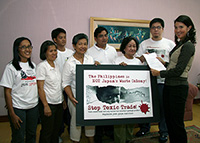Senator Questions Legal Significance of RP-Japan 'Side Deal' to JPEPA
 |
 |
 |
 |
| |
 |
|
| |
JPEPA "POST CARD": The Basel Action Network - Asia Pacific, Global Alliance for Incinerator Alternatives, Ecowaste Coalition, Greenpeace and other environmenal groups present to Sen. Pia Cayetano a giant post card expressing their opposition to JPEPA.
Photo by Gigie Cruz (GAIA) |
|
 |
 |
 |
|
| |
1 June 2007 (Metro Manila, Philippines) –
Amid reports of a renewed attempt to rush the ratification of the Japan-Philippines Economic Partnership Agreement (JPEPA) in the remaining sessions of the Senate next week, Senator Pia S. Cayetano today questioned the legal significance of a “side deal” committing Japan against exporting its toxic wastes to the country.
Cayetano said she welcomed the exchange of notes forged last May 24 by Foreign Affairs Secretary Alberto Romulo and Japanese Foreign Minister Taro Aso, saying that the move was a positive step toward resolving the controversies surrounding JPEPA.
At the same time, however, the lady senator asked whether a mere side note was enough to amend the agreement’s controversial provisions on toxic wastes.
“Definitely, Japan’s renewed assurance should be viewed as a positive step toward addressing the controversies surrounding JPEPA,” said Cayetano, who chairs the Senate committee on environment and natural resources. “But is it the proper procedure to amend a bilateral agreement through a mere exchange of diplomatic notes?”
“I think it is premature to conclude that the understanding puts a closure to the toxic waste issue, even as the Senate has yet to fully deliberate the contents of the main agreement itself,” stressed Cayetano, a lawyer.
Echoing the concerns of environmental groups, Cayetano is hoping that the May 24 understanding was not a mere publicity stunt aimed at making JPEPA more acceptable to senators and Filipinos.
She said that a more definite and legally binding commitment would be for both governments to ratify the Basel Ban Amendment, which prohibits the movement of toxic waste for disposal or recycling from rich to poor countries.
“Ratifying the Basel Ban Amendment would provide greater protection to the Philippines from becoming a dumping ground for toxic wastes, not only from Japan, but also from other industrial countries,” she stressed.
(Note: The Basel Convention restricts the movement of toxic waste from industrialized to poor countries, while the Basel Ban Amendment plugs the convention’s loopholes by prohibiting the practice of trading toxic waste whether for disposal or recycling. The Philippines and Japan are both signatories to the Basel Convention, but have yet to ratify the Basel Ban Amendment.)
Cayetano has been working closely with environmental groups, including the US based Basel Action Network (BAN) in studying the provisions of the JPEPA.
FAIR USE NOTICE. This document contains copyrighted material whose use has not been specifically authorized by the copyright owner. The Basel Action Network is making this article available in our efforts to advance understanding of ecological sustainability and environmental justice issues. We believe that this constitutes a 'fair use' of the copyrighted material as provided for in section 107 of the US Copyright Law. If you wish to use this copyrighted material for purposes of your own that go beyond 'fair use', you must obtain permission from the copyright owner.
More News
|